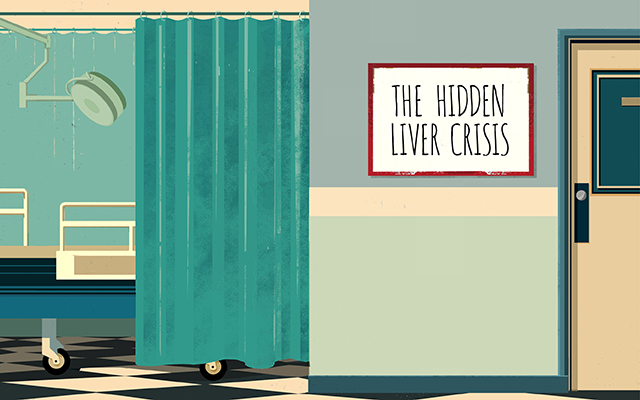I know it seems like each week delivers some humbling or hopeful news from the battlefield that is dementia research, but a couple of recent headlines struck me as more explosive than usual.
Big Pharma giant Biogen last week announced that it had finally stopped pretending that its controversy-laden drug Aduhelm has any future as a treatment for Alzheimer’s. It relinquished its ownership rights to the product and abandoned future clinical tests to focus on, well . . . another dementia drug of questionable value. That same day, JAMA Network Open published a study suggesting that, for some dementia patients at least, the pathway to a cure may begin not in the brain but in the liver.
You might call the collision of these two reports coincidental, but the irony seems fairly rich to me: A pharmaceutical giant gives up on its Alzheimer’s drug at the very moment researchers describe how diagnosing and treating a common liver disease may succeed where “miracle” Alzheimer’s drugs have failed.
The Aduhelm saga has been well documented. Rushed through the Food and Drug Administration’s vetting process in what one agency advisor called “the worst approval decision that the FDA has made that I can remember,” the move sparked a congressional inquiry that revealed the dark side of Big Pharma’s influence on the agency. Medicare officials quickly entered the fray, limiting the use of the drug to patients participating in clinical trials. That censure and widespread physician skepticism — along with the $56,000 annual cost of the treatment — essentially doomed Biogen’s so-called wonder drug. In the 18 months following its approval, Aduhelm generated a paltry $7.8 million in sales, the New York Times reports. In recent months, revenue has declined to the point that the company no longer offers any sales reports.
That woeful performance hasn’t deterred drugmakers from trotting out other variations on the Aduhelm model, drugs designed to modestly improve dementia symptoms among patients with mild cognitive impairment by reducing the amount of amyloid plaque on the brain. In fact, you could argue that Biogen was willing to dump its troublesome drug in large part because the company and its Japanese partner, Eisai, had already gained FDA approval of another Alzheimer’s drug, Leqembi. The agency is also expected to rubber-stamp Eli Lilly’s recent entry into the dementia drug market, donanemab, in the weeks ahead.
Clinical trials have shown that these latest pharmaceutical efforts can slow cognitive decline, but the improvements are so modest that patients and their caregivers may not even notice. And the threat of brain bleeding looms over the entire treatment process.
[What] if cognitive decline could be traced to the effects of a common organ disease?
But what if cognitive decline could be traced to the effects of a common organ disease? That was the question Jasmohan Bajaj, MD, a professor of medicine at Virginia Commonwealth University, and his team set out to answer in the study published in JAMA Network Open last week.
The study, involving 177,000 U.S. veterans with Alzheimer’s, suggest a link between undiagnosed cirrhosis of the liver and dementia. As Isabella Cueto reports in STAT News, researchers analyzed these veterans’ health records and found that about 10 percent of them may be suffering from the liver disease.
Earlier studies have described how trouble with the liver can translate to cognitive difficulties: When the organ can no longer effectively dispatch ammonia, manganese, and other toxins from the blood, they tend to migrate to the brain, infecting its cells. The result is what’s called hepatic encephalopathy, which produces cognitive symptoms that mirror those observed in people with dementia. This occurs in about half of patients who have been diagnosed with cirrhosis.
Bajaj and others believe this cognitive fog would clear if patients were treated with a course of antibiotics to reduce the toxic load or with a synthetic sugar called lactulose to flush the poisons through the colon. Bajaj isn’t promising a miracle cure for Alzheimer’s, but he says the liver–brain connection could be the key to relief for many patients. “If a portion of their symptoms is caused by hepatic encephalopathy, which is way easier to treat than dementia, then I think we need to look at that,” he tells Cueto.
[The] liver–brain connection could be the key to relief for many patients.
The trick is to catch the cirrhosis in its early stages, before the damage to the liver becomes irreversible. And that’s not easy, because in the absence of alcohol use disorder or a hepatitis B or C infection, physicians don’t routinely check liver function in their patients. There’s no simple blood test or other screening tool.
“It’s not a condition that hurts. Patients don’t come in asking to be screened for cirrhosis,” notes Lauren Beste, MD, deputy director of general medicine service at the VA Puget Sound Health Care System. “It’s easy to see why it could be overlooked, but it’s just such an important and lifesaving diagnosis to make early.”
Beste and others point to a FIB-4 test that could be used to determine whether more detailed scrutiny of a patient’s liver function is necessary. It’s not a perfect diagnostic tool — combining a basic liver enzyme test, platelet count, and a patient’s age — but it could sound a warning for potential issues.
That’s the main takeaway from Bajaj’s study, which used FIB-4 scores to estimate the prevalence of cirrhosis among the veterans with dementia. “Even if 100 percent of them had cirrhosis, that does not mean that 100 percent of them had [encephalopathy],” he explains. “That just tells you: Be aware. This may be lurking in our patients.”
More research, as they say, is needed. Perhaps somewhere down the road Bajaj or other researchers will identify another pool of dementia patients who have also been diagnosed with cirrhosis. Then they could treat them for hepatic encephalopathy and report the results. It wouldn’t make front-page news, I suspect, but it could offer a modicum of hope for some patients at a time when Big Pharma is delivering mostly empty promises.





This Post Has 0 Comments